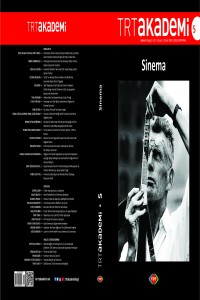Öz
Sanat
ile mâneviyat
arasında felsefî,
psikolojik,
sosyolojik ve etik bakımdan çok sıkı bir ilişki mevcuttur. Bu ilişki
edebiyat, tiyatro ve felsefe alanlarında olduğu gibi sinemada da ele alınan
konulardan biridir. Sinemada sanat ile mâneviyat üzerinde duran en önemli
yönetmenlerin başında Andrey Tarkovsky gelmektedir. Tarkovsky, 1966’da çektiği Andrey Rublev adlı filminde, ünlü bir ressamın
hayatına odaklanarak bu ilişkiyi ele almaktadır. Umutsuzluk, adaletsizlik ve
yoksulluğun yaygınlaştığı bir dönemde yaşayan Rublev, sanatıyla inancın
saflığını vurgulamaya ve yüksek bir ahlâk ideali ortaya koymaya çabalamıştır.
Bu çalışmada Andrey Rublev sinemasal
dramaturji yöntemi aracılığıyla psikolojik ve felsefi açılardan
analiz edilmektedir.
Kaynakça
- Andrey Tarkovski, Mühürlenmiş Zaman, 3. baskı. Çev. Füsun Ant, İstanbul: Agora Kitaplığı, 2008.
- Andrey Tarkovski, Şiirsel Sinema, (Der. John Gianvito), Çev. Ebru Kılıç, İstanbul: Agora Kitaplığı, 2009.
- Jeremy Mark Robinson, The Sacred Cinema of Andrei Tarkovsky, United Kingdom: Crescent Moon Publishing, 2006.
- Laurence Cosse, “Les mardis du cinema”, France Culture, 7 Ocak 1986, Fransızcadan Çeviren: Güven Güner, İstanbul, Eylül 1993. (http://www.thymos.com.tr/Tarkovsk.html)
- Nariman Skakov, The Cinema of Tarkovsky - Labyrinths of Space And Time (KINO - The Russian Cinema), New York: I.B.Tauris, 2012.
- Sean Martin, Andrei Tarkovsky, Vermont: Pocket Essentials, 2005.
Öz
There is a very close relationship between art and spirituality in terms of philosophical, psychological, sociological and ethical aspects. This relationship is one of the topics discussed in the cinema as well as in the fields of literature, theater and philosophy. Andrei Tarkovsky is an important director who thought that there was an inseparable link between art and spirituality; and he succeeded to build this relationship through his own language and method. In Andrei Rublev (1966), Tarkovsky discussed this relationship through the life of a famous painter who lived in the Middle Ages. Living in a period of despair, injustice, and poverty, Rublev struggled to emphasize the purity of his art and faith and to create a high moral ideal. In this study, Andrei Rublev analyzed philosophical, psychological and sociological aspects through the method of cinematographic dramaturgy.
Anahtar Kelimeler
Kaynakça
- Andrey Tarkovski, Mühürlenmiş Zaman, 3. baskı. Çev. Füsun Ant, İstanbul: Agora Kitaplığı, 2008.
- Andrey Tarkovski, Şiirsel Sinema, (Der. John Gianvito), Çev. Ebru Kılıç, İstanbul: Agora Kitaplığı, 2009.
- Jeremy Mark Robinson, The Sacred Cinema of Andrei Tarkovsky, United Kingdom: Crescent Moon Publishing, 2006.
- Laurence Cosse, “Les mardis du cinema”, France Culture, 7 Ocak 1986, Fransızcadan Çeviren: Güven Güner, İstanbul, Eylül 1993. (http://www.thymos.com.tr/Tarkovsk.html)
- Nariman Skakov, The Cinema of Tarkovsky - Labyrinths of Space And Time (KINO - The Russian Cinema), New York: I.B.Tauris, 2012.
- Sean Martin, Andrei Tarkovsky, Vermont: Pocket Essentials, 2005.
Ayrıntılar
| Birincil Dil | Türkçe |
|---|---|
| Konular | İletişim ve Medya Çalışmaları |
| Bölüm | Makale |
| Yazarlar | |
| Yayımlanma Tarihi | 15 Ocak 2018 |
| Gönderilme Tarihi | 20 Kasım 2017 |
| Kabul Tarihi | 11 Ocak 2018 |
| Yayımlandığı Sayı | Yıl 2018 Cilt: 3 Sayı: 5 |
This work is licensed under Creative Commons Attribution-NonCommercial-NoDerivatives 4.0 International


